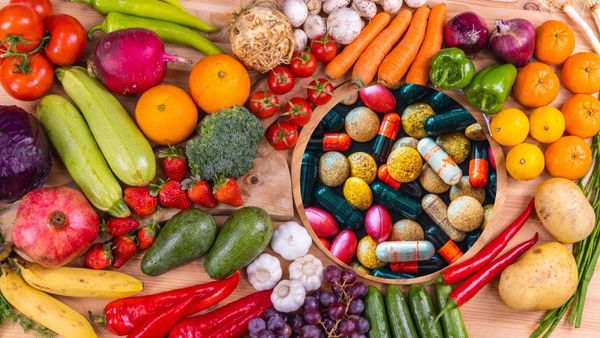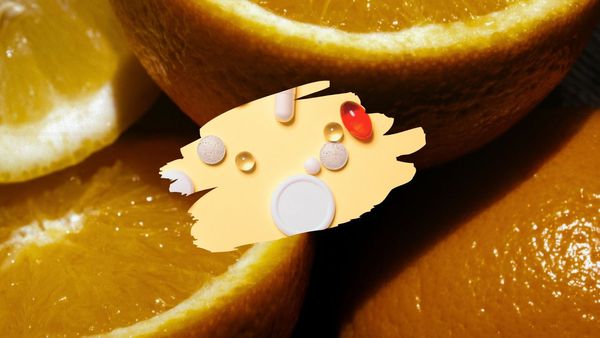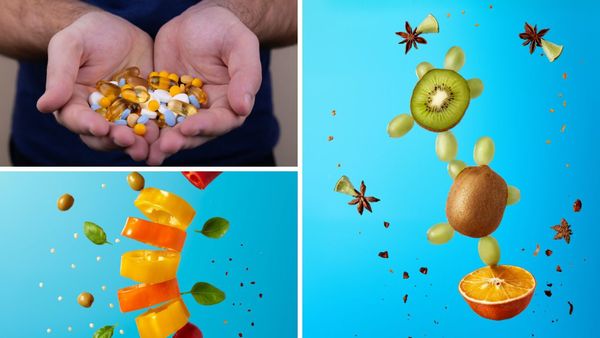Where does the word "vitamin" come from?
The word is derived from the Latin word vita (life) and the biochemical term amine (nitrogen-containing) because vitamins are required for life and were originally thought to be amines. Vitamins are organic compounds required by humans in small amounts from the diet.
What Are Vitamins?
A vitamin is a natural (carbon-containing) material derived from plants and pets that the body must have in extreme percentages. Without vitamins the body would certainly not make it through, vitamins are required for regular development, metabolism (developing energy in your cells), and also health.
Vitamins are required to make enzymes and also hormonal agents, which are very important compounds the human body utilizes to make all the chain reactions required to live. A lot of us get sufficient vitamins from our food, yet it may be essential for some people to take a vitamin supplement, because a continuous lack of vitamins will certainly lead to unsuccessful health and wellness, weakness, and sensitivity to condition.
The Body Needs At Least 13 Different Vitamins To Function Properly:
Vitamin A - Retinol; Vitamin B complex (B1 - Thiamine; B2 - Riboflavin; B3 - Niacin; B6 - Pyridoxine; B12 - Cyanocobalamin; B9 - Folic acid; B5 - Pantothenic acid; B7 - Biotin); Vitamin C - Ascorbic acid; Vitamin D - Calciferol (can be obtained through sunlight); Vitamin E - Tocopherol; Vitamin K - Menaquinone.
There are two kinds of vitamins: fat soluble and water-soluble.
Fat-Soluble Vitamins:
Vitamins A, D, E and also K are fat-soluble, they dissolve in fat yet not water. Once these vitamins are taken in by the body, they are stored mostly in the cellulites and also in the liver. The liver provides the key storage cells for vitamins A and also D. Vitamin E is stored generally in body fat as well as to a lesser extent in reproductive organs. Reasonably little vitamin K is stored.
Due to the fact that you can store these vitamins, you do not need to obtain a supply of them every day. Nonetheless, consuming fats or oils that are not absorbed can trigger shortages of fat-soluble vitamins. On the other hand, obtaining excessive amounts of these vitamins, particularly vitamins A and also D, can result in harmful levels in the body and also create issues.
Fat-soluble vitamins are required for the maintenance of healthy bones, skin and hair and for bringing nourishment to the cells. Vitamin A is essential for vision, especially night vision. Vitamin K is essential for the formation of blood-clotting proteins.
The major dietary sources of these vitamins are green leafy vegetables, deep orange or yellow fruits and vegetables, cod liver oil, sardines, butter, egg yolks, fortified milk, almonds, wheat germ, peanut butter, corn oil, sunflower seeds, and liver.
Water-Soluble Vitamins:
The water-soluble vitamins - vitamin C and also all the B vitamins - require to dissolve in water prior to your body can absorb them. Due to this, your body can not save these vitamins in any kind of substantial amounts. The water-soluble vitamins your body doesn't utilize are eliminated by your kidneys and also come out in your pee, so you require a fresh supply of these vitamins everyday. You can not really overdose on water-soluble vitamins, unless you take really massive doses.
B vitamins are involved in fat and protein breakdown. The B vitamins are required for healthy nervous system function, healthy skin, hair, eyes and liver function. Some of the B vitamins require other B vitamins to work correctly in the body.
Vitamin C (ascorbic acid) is important to the body in the production of collagen, creating connective tissue and supporting our organs. Other functions include protecting the fat-soluble vitamins and preventing scurvy.
Water-soluble vitamins are easily ruined or washed out during food storage space or preparation. Correct storage as well as preparation of food can minimize vitamin loss. To reduce vitamin loss, refrigerate fresh produce, keep milk and grains away from strong light, as well as use the cooking water from veggies to prepare soups.
The major dietary sources of these vitamins are cereal grains, meat, poultry, eggs, fish, milk, legumes and fresh vegetables. Vitamin C is found in citrus fruits, guava, red bell pepper, papaya, orange juice, broccoli, green bell pepper, strawberries, cantaloupe, tomato juice, mango, potato, cabbage, tomato, collard greens, spinach, Brussels sprouts, turnip greens, cauliflower, blackberries, and blueberries.
How to obtain vitamins?
It is best to get the nutrients your body needs through the food you consume. A daily diet regimen of diverse foods can give you needed minerals and vitamins for maintaining a healthy and balanced body. To obtain the most vitamins possible from your food, cool fresh produce and maintain milk and also grains away from solid light. Vitamins are easily damaged and washed out throughout food preparation as well as storage space.
There are also a number of other factors that deplete our bodies of important vitamins:
* Smoking - strips 25mg of vitamin C for each cigarette smoked.
* Stress - utilizes a lot of B-complex vitamins and minerals.
* Eating sugar and other refined products - will strip chromium, zinc, vitamin B3 and other minerals from the body.
Too little of just one vitamin may disturb the body's balance and lead vitamin deficiency. Some deficiencies can be cured simply by eating foods that contains the vitamin that you need. Other deficiencies lead to diseases and conditions that are more difficult to treat.
However, taking too many vitamins can also be dangerous. This is especially true of the fat-soluble vitamins A, D, E and K: it is harder to get rid of the excess of these vitamins in the body. You should never take extra vitamins and minerals without talking to your doctor first. Your doctor may also suggest taking extra vitamins or minerals if you have certain health problems.
We appreciate you reading this!
If you enjoyed this article, please consider our other publications and by signing up to our newsletter, you'll have immediate access to our latest articles.










